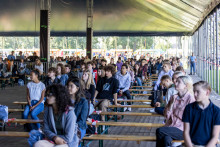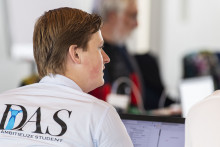It is well known that students experience a lot of pressure. The RIVM, student organisations, educational institutions, and politicians all agree that the pressure needs to be taken off. The Minister indicates that lowering the BSA norm could provide an initial solution to this, but the student delegation of the University Council does not entirely agree. It argues that the BSA is not the cause of the high pressure on students.
The RIVM cites the housing shortage, Fear Of Missing Out (FOMO), social media influences, and the abolition of the ‘basisbeurs’ scholarship as major causes of the pressure students experience. The increasing BSA standard also causes stress. At the same time, the measure in itself provides a motivational push. An excessive BSA norm, combined with the housing shortage, financial stress, social pressure, the high workload, and a long academic year, results in problems, but not the BSA in itself. Simply lowering the BSA, without paying extensive attention to the aforementioned issues, is too short-sighted for us for that reason.
Bill
The proposal to set the BSA at a maximum of 30 ECTS in the first year and a maximum of 60 ECTS in the second year seems undesirable to the student delegation. Firstly, because a standard after two years of study can be still be stressful. Students may still face a cold shower after investing a lot of time, energy, stress and money. It creates more stress without achieving the original goals of the BSA. Consequently, the student body is against a norm after two years.
Secondly, a national norm of 30ECTS seems undesirable to us. Different institutions have different forms of education and the BSA policy should reflect this. At the University Twente, we work a lot with project-based education, so a different norm is appropriate from institutions that works mainly with exams. The same can be said for University College; a different standard is also appropriate for the small-scale intensive form of education. The institution, in consultation with the employee participation body, can make the best consideration in this.
It should be acknowledged that the BSA is perceived as predominantly negative for 16% of students. That is too many. We need to work towards a standard that is perceived as helpful to more students and, moreover, there should be more personal guidance if the standard does turn out to be too high. In line with this, students indicate that the problem lies in the height of the standard, not the standard itself. Additionally, 30% of students indicate that they are predominantly positive about the BSA. For this group, it is not desirable to change the policy rigorously.
Feasibility of programmes
In addition, the feasibility of a programme should be better analysed. The ability to successfully study in a programme (‘studeerbaarheid’) is mentioned by Fontys as one of the key points to make the BSA effective, but it also has a major impact on the perceived pressure by students. After all, a full-time bachelor should guarantee 40 hours of study in the week. Yet many students, especially in the first year, easily spend 60 hours a week studying. The BSA understandably increases the perceived pressure for these students, but the problem lies with the studyability of the programme, not the BSA. Therefore, BSA - with reasonable standard - has its place and more room in the programmes is needed.
Quality of education
Due to the reduction in year one, more students will move on to the second year of study, who are expected to have insufficient prior knowledge. This results in a lower quality of education, as fellow students will have to work together with students who do not master the material, especially in project education at the University of Twente. A point of concern, which the Fontys study also cites. Moreover, the student body states: more students, fuller lecture halls, less attention for individual students. Reason enough to worry.
The Fontys study shows that only 29% of students with a negative BSA obtain a degree at a new programme within 5 years (nominal +1). This requires a huge time investment from both student and teacher. It also has adverse financial consequences for the student, a major stress factor, and the educational institution.
The BSA does fulfil its purpose
The BSA has three main goals: to expedite student dropout, to help students get into the right programme as soon as possible, and to shorten the average length of study. Statistics from the University of Twente and the Higher Education Policy Monitor both show that the time of dropout has indeed been brought forward compared to before the introduction of the BSA. Now, dropouts mainly occur within 1 year. Thus, significantly lowering the standard means that many students will only find out later that their study choice was not the right one after all. The goal of helping students get on the right course as soon as possible is thus not achieved.
Finally, the Fontys research indeed shows that the BSA lowers the average study duration. 81% of students with a positive BSA graduate within 5 years (nominal duration +1 year). Of students with a negative BSA, only 29% graduate within 5 years. Reason enough to keep the BSA with points standard, the student delegation thinks, at least under the current funding system.
Request to politics
The student delegation requests the ministry and politics in The Hague to enter into dialogue with the participation bodies and to leave the autonomy with the institutions and study programmes. Different types of education (e.g. project-based, small-scale intensive education) require different BSA norms. The institutions - in consultation with the participation bodies - can make the best consideration in this together. The starting point of a 40 to 45ECTS maximum seems appropriate, as long as it can be deviated from with well-founded arguments. For those for whom this does not apply, personal guidance should be realised and the possibility of applying for a deferred BSA should be clearly communicated. In consultation with the student, an adapted study path must then be realised. We are happy to enter into discussions with politicians to develop this proposal further. This way, we work towards a BSA that serves students.







